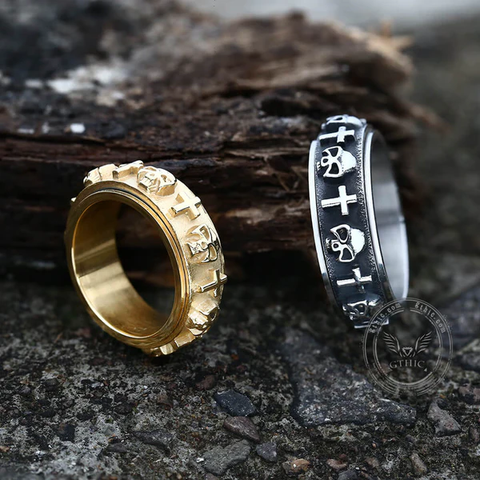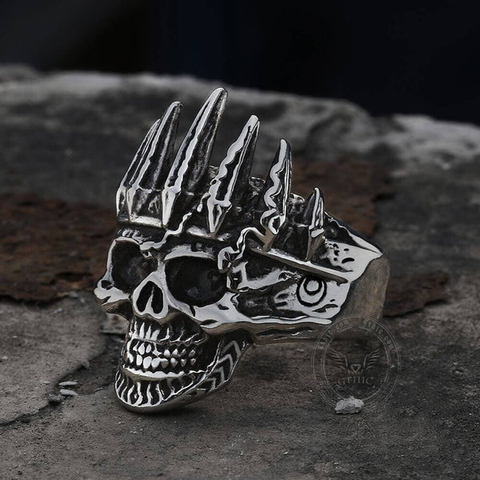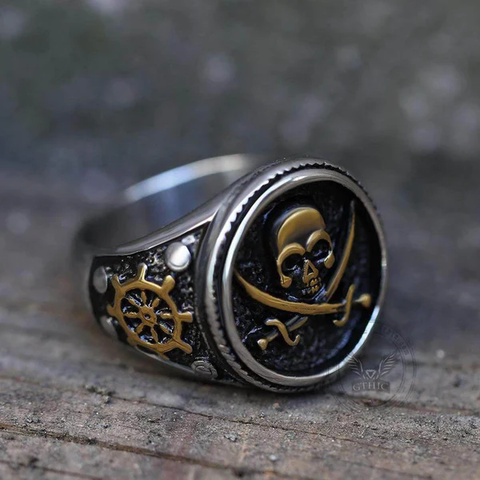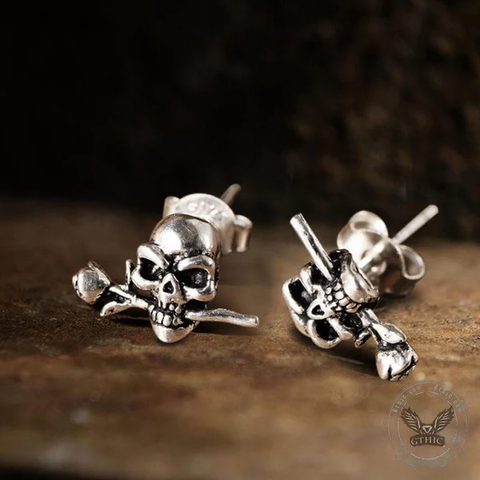What Is The History And Symbolism Behind Skull Jewelry?
The skull has long been an enigmatic and intriguing symbol, often associated with death, danger, and rebellion. It's no wonder that this powerful motif has made its way into men's jewelry throughout history, from ancient cultures to modern fashion. Whether used as a reminder of life's transience or as a bold statement of individuality, the skull has always held a certain mystique and allure for men. So, are you ready to dive into the fascinating world of skull-inspired men's jewelry and discover its rich history and symbolism?
What is the History behind Skull Jewelry
The use of skull-shaped jewelry dates back to ancient times, where it symbolized power, strength, and bravery. Gladiators and warriors in ancient Rome and Norse mythology wore skull rings and pendants to display their fearlessness and honor the dead. In the Aztec culture, skulls played an important role in religious ceremonies and beliefs. The Aztecs believed that the dead were reborn in the afterlife, and skulls were used in death rings to honor and remember the departed.

In the Middle Ages, Death was a constant presence, with disease, war, and other dangers lurking around every corner. This sense of mortality was reflected in the art and literature of the time, which often depicted skulls and other morbid imagery. skull motifs in art and culture reminded people of the transience of life, and knights wore skull pendants as a form of protection in battle. During the Renaissance, skull-shaped jewelry continued to symbolize the fragility of life and the inevitability of death. This was in part due to the bubonic plague and other epidemics that ravaged Europe during this time, leading many people to contemplate the fleeting nature of their existence.
However, the symbolism shifted somewhat during the Victorian era, with skulls becoming associated with mourning and remembrance. In the 20th century, skeleton jewelry took on a new meaning as it became associated with rebellious subcultures like punk and goth. Skull accessories represented anti-establishment and anti-authoritarian sentiments in punk culture, while goth culture used skull-themed jewelry to express a fascination with the darker aspects of life.

What the Different Types of Skull Represent
Skulls have been using as symbols throughout history to today, and different cultures and groups have attached different meanings to them. Here are some examples of what different types of skulls can represent:
- Human Skull: This is the most common type of skull used in jewelry and symbolism. It is often seen as a symbol of mortality and the transience of life. The use of human skulls in jewelry and art is often meant to remind us that life is fleeting and that we should live in the moment.
- Animal Skull: In some cultures, animal skulls are believed to possess certain spiritual or magical qualities. For example, In Viking mythology, the wolf was associated with the god Odin and his wolves, Geri and Freki, and wolf skull ring was seen as a symbol of the warrior spirit. In Gothic and occult subcultures, the raven skull is often used as a symbol of death and the afterlife. It is seen as a powerful talisman that can protect the wearer from harm and provide insight into the mysteries of the universe.
- Skull and Crossbones: The skull and crossbones symbol has been associated with piracy and danger used in marine rings for centuries. It is often used to warn of danger, particularly in contexts like poison labels or warning signs.
- Sugar Skull: The sugar skull ring is a traditional symbol used in Mexican culture during the Day of the Dead (Dia de los Muertos) celebration. It is meant to honor and remember loved ones who have passed away, and is often decorated with bright colors, flowers, and other festive designs.
- Celtic Skull: In Celtic culture, the skull is often seen as a symbol of protection and warding off evil, incorporating intricate knotwork designs in Celtic cross rings, which are meant to symbolize the interconnectedness of all things.
- Crystal Skull: Crystal skull necklaces have become popular in recent years as a symbol of healing and spirituality. They are often believed to possess powerful energy and can be used for meditation, chakra balancing, and other spiritual practices.
What Other Elements can the Skull be Combined with
The popularity of skull-themed men's jewelry has increased in recent years, and it's not uncommon to see skulls incorporated into mainstream fashion. Some popular styles of skull jewelry include skull rings with intricate detailing and gemstones, leather bracelets with metal skull accents, and skull necklaces with bold, chunky chains. One popular way that skulls are used in men's jewelry is by combining them with other motifs to create a unique and edgy look. For example:
- wing: represents the idea of transcendence and the release from the earthly realm. It was often worn by those who embraced a bohemian lifestyle and saw themselves as free spirits. The skull with wings could be found in gothic necklace pendants worn by artists, poets, and other creative types who were drawn to the Gothic style.
- Snake: represents death and rebirth, as well as a connection to the underworld, commonly found in snake jewelry, as well as other accessories like belts and buckles.
- Crown: represents power and authority, as well as the inevitability of death. Skull crown ring creates a bold and regal statement that is popular among men who want to project a sense of strength and authority.
- Eagle: represents freedom, strength, and power. This motif is particularly popular in biker fashion, where it symbolizes the free-spirited and adventurous nature of the biker lifestyle. The eagle represents freedom and strength, while the skull adds a sense of danger and mortality to the design.
- Dagger: represents strength, protection, and danger. This combination creates a bold and powerful statement that is popular among men who want to project a sense of strength and protection. The dagger represents strength and protection, while the skull adds a sense of danger and mortality to the design in pirate rings.
- Flower or Butterfly: to create a playful yet stylish accessory, adding a touch of femininity and beauty to the typically masculine skull motif. The combination of skull and roses is often seen in tattoos, jewelry, and clothes. It can represent the duality of life and death, love and loss, and beauty and decay. It creates a playful and unique design that is popular among men who want to express their individuality and personal style in a fun and stylish way.
How to Choose a Perfect One for Your Collection of Skull Jewelry
Choosing the perfect skull jewelry for your collection can be a fun and exciting experience, but it can also be overwhelming with so many options available. Here are some tips to help you make the right choice:
- Consider your personal style: Skull jewelry comes in many different styles, from classic and traditional to modern and edgy. For instance, biker rings are often associated with a specific style and aesthetic that reflects the lifestyle of motorcycle riders. Consider your personal style and what would complement your wardrobe.
- Choose the right metal: Skull jewelry can be made from a variety of metals, including silver, gold, platinum, and stainless steel. Consider your budget and which metal would best suit your preferences.
- Look for quality craftsmanship: The quality of the craftsmanship can greatly affect the overall look and durability of the piece. Look for handmade jewelry with details like clean and precise engravings, smooth and polished surfaces, and well-made clasps and chains.
- Consider the symbolism: Skulls can have different meanings and symbolism depending on the culture and context. Consider what the skull jewellery represents to you and whether it aligns with your personal beliefs and values.
- Choose a piece that resonates with you: Ultimately, the perfect skull jewelry for your collection is one that speaks to you and resonates with you on a personal level. Choose a piece that you love and that you'll enjoy wearing.
Conclusion
In conclusion, skull jewelry for men has a rich and fascinating history dating back to ancient times. The symbolism of skulls has shifted over time and context, from reflecting on life's transience to mourning and remembrance, and from death and morbidity to resilience and rebellion. Men's skull jewelry is now incorporated into mainstream fashion, and designers are experimenting with new materials to create unique and edgy pieces. Overall, the versatility of the skull motif in jewelry for women and men allows for endless possibilities in design and style, making it a popular choice for those looking to express their individuality and personal style.








